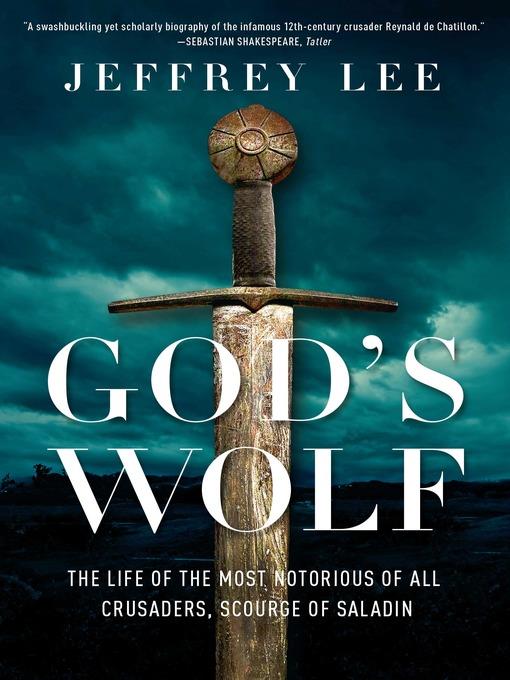
God's Wolf
The Life of the Most Notorious of all Crusaders, Scourge of Saladin
کتاب های مرتبط
- اطلاعات
- نقد و بررسی
- دیدگاه کاربران
نقد و بررسی

June 15, 2017
Elegant biography of a little-known Frankish crusader who is still a thorn in the sides of Islamists.South Africa-born, London-based journalist Lee uses the life of Reynald de Chatillon as a way to tell the story of the Second Crusade (1145-1149), a mostly disastrous affair for the Christians that paved the way for Saladin's subsequent sack of Jerusalem in 1187. Lee portrays Reynald--who was from Burgundy and responded as a young knight-errant to Abbot Bernard de Clairvaux's call to reclaim the city of Edessa--as the chivalric ideal. A younger son, Reynald had little recourse to economic betterment other than joining the military and hoping to secure riches and fame from the militant, expansionist Christian army spurred by the pope to reclaim the Levant from the Muslims. With his courtly manners and keen sense of potential glory, Reynald was nonetheless trained as a merciless killer, and he was enlisted to aid the defense of the crusader state of Antioch, where he caught the eye and sympathy of the widowed princess Constance, whom he married. Now as a prince of Antioch, Reynald had to continually defend the principality from Muslim raids, but he also invaded and sacked the Christian island of Cyprus "in a piratical fashion," gaining him the opprobrium of the Byzantium emperor and Muslims alike. Throughout, Lee graphically portrays the gory violence that dominated the era. Captured by the Turks after the battle of Marash in 1161, Reynald spent the next 15 years imprisoned in Aleppo, under the jurisdiction of Turkish leader Nur al-Din. During the last 10 years of his life, Reynald would chastise his nemesis Saladin from the Arabian Peninsula to the Kingdom of Jerusalem. In 1187, he was captured in the Battle of Hattin and executed after refusing to renounce his faith. A vivid narrative that effectively delineates the era's courtly spirit and "nightmarish barbarity."
COPYRIGHT(2017) Kirkus Reviews, ALL RIGHTS RESERVED.

Starred review from July 1, 2017
The crusader knight Raynald of Chatillon (112587) has suffered bad press from foe and friend alike. Muslim chroniclers of the great sultan Saladin, Raynald's most effective adversary, naturally don't approve of him. Furthermore, the most esteemed Christian eyewitness to his deeds, Walter of Tyre, belonged to the other party vying for predominance in the Crusader states and isn't trustworthy on him. Lee presents a balanced account, emphatically not denying Raynald's violence and cruelty but pointing up his superior diplomacy, especially as a politically astute marriage broker, his utter loyaltyunlike that of Raymond III of Tripoli, who ran out on the Battle of Hattin, ensuring Raynald's defeat and death (at Saladin's own hands, as the sultan had sworn) and, eventually, the fall of crusader-conquered Jerusalemand his fearless leadership from the forefront of battle. One particularly signal achievement of Raynald's was the raid by sea of both shores of the Red Sea, including the only sallies toward Medina and Mecca ever made by infidels. Lee's clear narration and reasonable approach vault Raynald back to the heights he deserves to occupy as a knight and a Crusader. An outstanding addition to popular literature on an enduringly influential historical epoch.(Reprinted with permission of Booklist, copyright 2017, American Library Association.)

June 15, 2017
Lee (Dog Days and Butterfly Man) explores the life of Reynald de Chatillon (1120-87), a notorious fighter during the Second Crusade. Chatillon has a reputation for brutality and violence, which Lee believes is exaggerated and misplaced. After a brief background on French society and the First Crusade, Lee argues that Chatillon's ferocity was typical of a warrior at that time and that his notoriety is the result of a smear campaign by his enemies. Lee investigates his subject's most notorious exploits, such as his stint as Prince of Antioch, lengthy imprisonment in Aleppo, raids against the Hajj pilgrim routes, and eventual execution. Chatillon is portrayed as a daring and bold warrior who was respected by his king and entrusted with diplomatic and regency roles. The author also emphasizes his subject's administration and matchmaking accomplishments to prove he was more than a terrifying warlord. Lee's arguments concerning the diversity of Chatillon's roles are more effective than the contextualization of his cruelty, as he never fully demonstrates how other warriors during that time compared. VERDICT A highly readable yet general overview of Chatillon's life and the Second Crusade. Readers desiring an in-depth analysis should look elsewhere. [See Prepub Alert, 3/20/17.]--Rebekah Kati, Durham, NC
Copyright 2017 Library Journal, LLC Used with permission.

March 15, 2017
An ordinary foot soldier who became prince of Antioch, Reynald de Chatillon was the most savage of crusaders and remains a hated figure in Islamic history; in a 2010 terrorist plot, al-Qaeda hid a bomb in a FedEx shipment addressed to him. He's probably best known to generalists from Ridley Scott's 2005 film Kingdom of Heaven. Now, an award-winning broadcast journalist tells his story, acknowledging his brutality while showing him to be an effective statesman. The Sunday Times (UK) praised the "blockbuster sensibility."
Copyright 2017 Library Journal, LLC Used with permission.

























دیدگاه کاربران